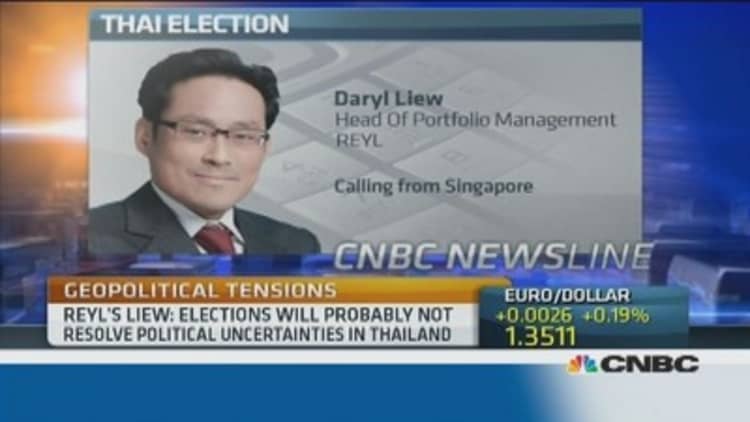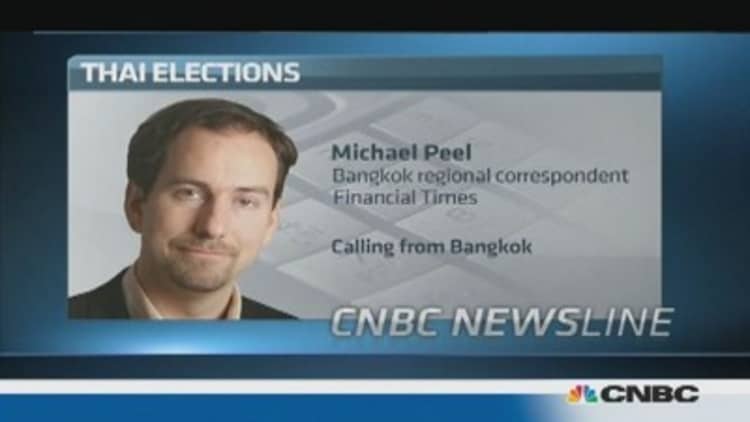Thailand's beleaguered government faced trouble on two fronts Tuesday as demonstrators clashed with police and an anti-corruption body announced charges against Prime Minister Yingluck Shinawatra over the state rice-buying program.
In the Thai capital Bangkok, there were clashes between police and anti-government protesters, resulting at least three deaths,including a police officer, with dozens wounded. Thai police had been attempting to reclaim protest sites around government offices in Bangkok and to allow traffic to proceed through blocked intersections.
Meanwhile, the country's National Anti-Corruption Commission announced it would file charges against Yingluck over the management of the country's multibillion-dollar rice subsidy program. The scheme, introduced in 2011, has long been criticized as a waste of time and money, losing around $4.3 billion on the 2011-2012 crop, the last time losses were reported.
The program was meant to increase rural income –and thereby consumption – by buying rice from farmers at higher than the market rate. However there have been reports that farmers haven't been paid in around four months.
(Read more: Thai rice subsidies: damned if you do, and don't)
Last month, Vichai Sriprasert, CEO of Riceland International, a Thai rice exporter, told CNBC that he believed at least a third of the $24 billion in total funding was lost through theft and corruption, with only a third of the sums actually reaching farmers.

In a National Anti-Corruption Commission statement issued Tuesday, Vicha Mahakhun, a member of the body said: "Although she (Yingluck Shinawatra) knew that many people had warned about corruption in the scheme, she still continued with it. That shows her intention to cause losses to the government so we have unanimously agreed to charge her."
The rice program problems are the latest in a series of headaches for the prime minister, who has faced a flurry of attempts to oust her from power.
(Read more: Thai unrest casts doubt on investment expansions)
"This case is quite complicated," said Mayuree Chowvikran, a strategist at Maybank-Kim Eng, noting the senate could be called upon to vote on the matter or it could be sent to the supreme court.

Until the charges were announced,it had appeared the political uncertainty in Thailand might be easing. The country's constitutional court had rejected an opposition request to annul the election held on February 2 and the caretaker government was meeting with the election commission to set a time to hold "make-up"elections in districts where protesters blocked voters from the polls or candidates from registering.
(Read more: Thailand's politics remain a mire, so why are its shares up?)
The current round of protests and violence,which began in late October, were triggered by the possibility that former Prime Minister Thaksin Shinawatra, ousted in a 2006 coup, could be granted amnesty on 2008 corruption charges.
While plans for the amnesty were dropped, protests have broadened to call for Yingluck, who is Thaksin's sister, to step down and an unelected "people's council" to be put in her place. Last December, Yingluck called a snapelection in an unsuccessful bid to defuse the protests.
The charges from the anti-corruption commission could "totally derail the whole election,"said Paul Gambles, managing partner at MBMG International, noting several other political figures could also face charges.
(Read more: Rate cut talk growing in Thailand)
"It's not necessarily a completely negative thing," he said. "If the whole election is null and voided, that would give an opportunity for a national reconciliation (via) a committee to be appointed for a period of time," which would allow for a cooling off period, he said.
But, Gambles added, February 27, the day the anti-corruption body issues its decision on the charges, could be a "dangerous day" as both sides could mobilize protesters.
—By CNBC.Com's Leslie Shaffer; Follow her on Twitter @LeslieShaffer1

